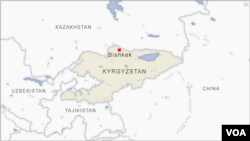Authorities in Kyrgyzstan this week detained 11 journalists from four independent outlets in a crackdown that human rights groups say underscores democratic backsliding in the Central Asian country.
The raids began on Monday when police in the capital Bishkek raided the newsroom of the independent outlet 24.KG and briefly detained and interrogated its director and two top editors.
On Tuesday, police detained 11 reporters, according to press freedom groups and media reports.
Those detained on Tuesday have investigated alleged corruption among the country's elites, according to the press freedom group Reporters Without Borders, or RSF.
"This wave of arrests on the basis of a dubious charge amounts to a purge of local investigative journalism," Jeanne Cavelier, the head of RSF's Eastern Europe and Central Asia desk, said in a statement.
"Investigating corruption is not a crime and police should not be used as a tool of intimidation. We denounce this witch-hunt against journalists and call on the Kyrgyz authorities to release them at once," Cavelier continued.
Kyrgyzstan's interior ministry said the arrests were over material calling for "mass riots" on the social media pages of the outlets Ayt Ayt Dese and Temirov Live.
Kyrgyzstan's embassy in Washington did not immediately reply to VOA's email requesting comment.
In a joint statement on Tuesday, eight human rights groups, including Human Rights Watch, called on Kyrgyz authorities to drop the criminal cases of "war propaganda" and "calls to mass disorder" that had been initiated against several outlets.
"The Kyrgyz authorities need to take immediate and decisive steps to bring the country's respect for press freedom in accordance with its international obligations," the statement said.
Out of 180 countries, RSF in 2023 ranked Kyrgyzstan 122 in terms of press freedom, which marked a drop of 50 spots from the previous year.
Kyrgyzstan's parliament is currently considering a draft media law that human rights groups have warned would expand government control over the media, including giving authorities broad powers to shut down news outlets.
The parliamentary committee on international affairs on Monday postponed consideration of the draft law.





